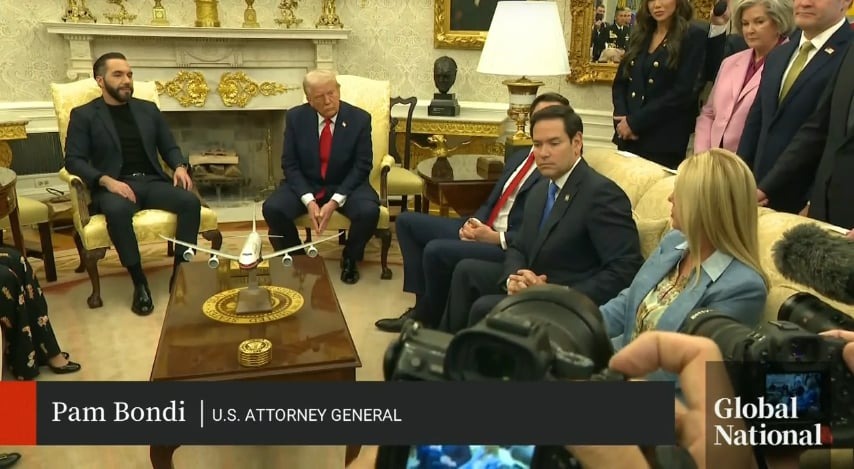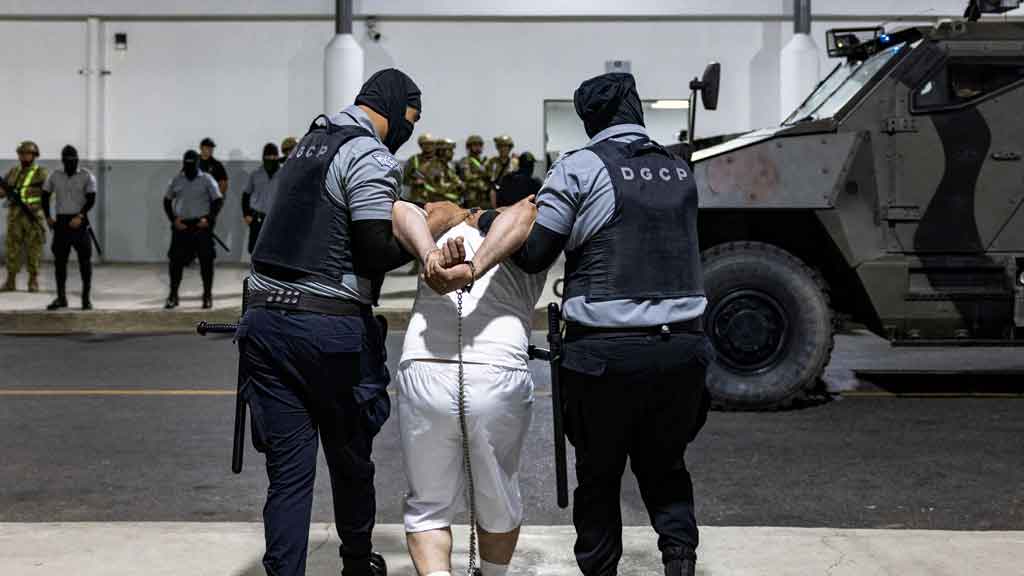In a stunning Oval Office exchange on Monday, President Donald Trump expressed openness to deporting U.S. citizens convicted of violent crimes to El Salvador’s notorious mega-prison, a proposal that has ignited fierce debate over constitutional protections and due process. Speaking alongside Salvadoran President Nayib Bukele, Trump mused about sending “homegrown criminals” to the Central American nation’s Terrorism Confinement Center (CECOT), signaling a provocative escalation of his immigration crackdown. The remarks, made during a meeting to solidify U.S.-El Salvador deportation ties, have drawn sharp rebukes from legal scholars, Democrats, and even some Republicans, who warn the idea flouts foundational American law.
Trump’s comments came amid discussions about a controversial deal under which El Salvador has accepted over 250 alleged gang members—mostly Venezuelans—from the U.S. since March, housing them in CECOT for a reported $6 million fee. The arrangement, enabled by Trump’s invocation of the 1798 Alien Enemies Act, has already stirred legal battles, with courts questioning the deportations’ legality. Now, Trump’s suggestion to include American citizens in this pipeline—potentially without robust legal scrutiny—has raised alarms about authoritarian overreach, testing the limits of executive power in his second term.
A Radical Proposal Amid a Tense Partnership

The Oval Office meeting, attended by Attorney General Pam Bondi and Secretary of State Marco Rubio, was meant to showcase U.S.-El Salvador collaboration. Bukele, lauded by Trump for his iron-fisted anti-gang policies, has positioned CECOT—a sprawling facility holding 15,000 inmates—as a solution for U.S. deportees. Trump praised the prison as a “great facility” and urged Bukele to “build more,” framing it as a deterrent for crime. “We have homegrown criminals that push people into subways, hit elderly ladies with bats—absolute monsters,” Trump said, per Reuters. “I’d like to include them, but we’re studying the laws.”
The proposal surfaced as Trump deflected questions about Kilmar Abrego Garcia, a Maryland man mistakenly deported to CECOT in March despite court protections. Bukele dismissed calls to return Abrego Garcia, calling the idea “preposterous” and akin to “smuggling a terrorist.” Trump, backed by Bondi and Rubio, insisted the U.S. lacked authority to retrieve him, despite a Supreme Court order to “facilitate” his return. The case, exposing flaws in the deportation process, underscored the risks of Trump’s broader vision. “If they can do this to a non-citizen,” said Rep. Linda Sanchez (D-CA), “what’s stopping them from targeting citizens?”
Legal experts were swift to condemn Trump’s citizen deportation idea as unconstitutional. The 14th Amendment guarantees citizenship rights, and the Supreme Court has long held that citizens cannot be forcibly removed, except in rare cases like treason or fraudulent naturalization. “This is a nonstarter,” said Georgetown Law’s Steve Vladeck. “Deporting citizens, even criminals, violates bedrock principles. It’s not a loophole you can study—it’s a wall.” Peter Markowitz of Cardozo Law called it “a dangerous fantasy,” noting that even convicted citizens retain due process rights.
The El Salvador Deal: A Troubled Precedent
Trump’s remarks build on a contentious U.S.-El Salvador agreement, brokered after Bukele’s February meeting with Rubio. The deal allows the U.S. to send alleged gang members—primarily from Venezuela’s Tren de Aragua and El Salvador’s MS-13—to CECOT, bypassing traditional deportation to their home countries. Since March 15, over 260 individuals have been transferred, including 17 more on March 30, despite a federal judge’s order halting such moves under the Alien Enemies Act.

The Act, last used during World War II, permits deportations of enemy nationals during wartime or “invasion.” Trump’s team argues Tren de Aragua’s U.S. presence justifies its use, but critics, including the ACLU’s Lee Gelernt, call it a peacetime abuse. “Congress never intended this for gangs,” Gelernt said. “It’s a pretext to sidestep hearings.” Court filings reveal shaky evidence—tattoos or clothing often suffice to label someone a gang member—raising fears of wrongful deportations.
CECOT, a 40,000-capacity prison, has drawn global scrutiny for its conditions. Inmates face windowless cells, metal bunks without mattresses, and mass trials with scant legal recourse. Human rights groups like Cristosal document torture, sexual assault, and 367 deaths, mostly of unconvicted detainees. “It’s a black hole,” said lawyer Lindsay Toczylowski, whose Venezuelan client, a gay artist with no criminal record, was deported based on “benign tattoos.”
The U.S. has paid El Salvador $20,000 per deportee annually, totaling $6 million so far, with plans to expand. Bukele’s viral posts—showing shackled arrivals with shaved heads—bolster his “coolest dictator” image, while Trump calls him a “friend.” But the deal’s opacity worries analysts. “We’re outsourcing justice to a regime accused of abuses,” said Human Rights First’s Anwen Hughes. “Citizens could be next if this goes unchecked.”
Public and Political Firestorm
Reaction to Trump’s citizen deportation idea was swift and polarized. On X, some cheered the tough stance—“Criminals don’t deserve citizenship,” one user wrote—while others decried it as “un-American.” Rep. Alexandria Ocasio-Cortez (D-NY) called it “bone-chilling,” warning of a “nightmarish” precedent. Sen. Jeanne Shaheen (D-NH) urged compliance with court orders, citing Abrego Garcia’s case as a red flag.
Even Republicans wavered. Sen. Mike Rounds (R-SD), while supportive of Trump’s immigration push, stressed legal adherence on CNN’s State of the Union. “We don’t know if that’s feasible,” he said of citizen deportations. Others, like Sen. Marco Rubio, doubled down, praising Bukele’s “security leadership” and framing deportees as “violent criminals.”
The public’s unease reflects broader tensions. A YouGov poll shows 46% approve of Trump’s immigration policies, but only 29% support extralegal measures. Posts on X highlight fears of overreach: “First immigrants, now citizens—what’s the line?” one user asked. Another warned, “This is how democracies slide.”
Legal and Practical Hurdles
Trump’s team insists it’s exploring “legal pathways,” with Bondi tasked to review statutes. But experts see no wiggle room. “Citizenship isn’t a privilege you revoke for crime,” said constitutional scholar Carl Tobias. “Exile is banned under international law, too.” The 1957 Trop v. Dulles ruling deems denationalization a “cruel and unusual” punishment, and no U.S. law permits deporting citizens en masse.
Practically, El Salvador’s stance complicates matters. Bukele’s refusal to return Abrego Garcia, despite U.S. court orders, suggests he’d resist citizen transfers unless financially incentivized. “He’s playing to Trump’s base and his own,” said analyst Clara Torres. “But CECOT’s already strained—40,000 inmates, no trials. Adding Americans would be logistical chaos.”
What’s Next?
The proposal’s fate hinges on legal challenges and political will. The ACLU and Democracy Forward plan to sue if citizen deportations advance, citing due process violations. A D.C. Circuit Court appeal on the Alien Enemies Act looms, with Judge James Boasberg’s rulings under scrutiny. “This isn’t just policy—it’s a constitutional crisis,” said Tobias.
Trump’s base may rally—56% of Republicans back harsher deportation in a Rasmussen poll—but moderates and independents, key to 2026 midterms, are wary. “He’s gambling with fire,” Torres said. “Push too far, and the backlash could dwarf the applause.” For now, the idea remains a trial balloon, but its ripples expose a nation divided over justice, citizenship, and the rule of law.
White House press secretary Karoline Leavitt later confirmed that the proposal was on the table, saying Trump had “simply floated” the idea.



